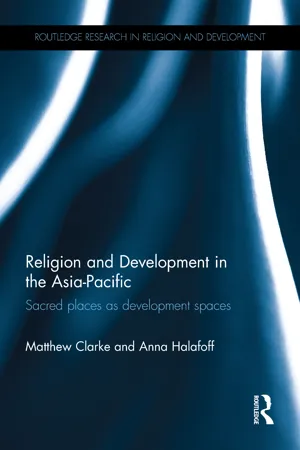
Religion and Development in the Asia-Pacific
Sacred places as development spaces
- 152 pages
- English
- ePUB (mobile friendly)
- Available on iOS & Android
Religion and Development in the Asia-Pacific
Sacred places as development spaces
About This Book
Community development is most effective and efficient when it is situated and led at the local level and considers the social behaviours, needs and worldviews of local communities. With more than eight out of ten people globally self-reporting religious belief, Religion and Development in the Asia-Pacific: Sacred places as development spaces argues that the role and impact of religions on community development needs to be better understood. It also calls for greater attention to be given to the role of sacred places as sites for development activities, and for a deeper appreciation of the way in which sacred stories and teachings inspire people to work for the benefit of others in particular locations.
The book considers theories of 'place' as a component of successful development interventions and expands this analysis to consider the specific role that sacred places – buildings and social networks – have in planning, implementing and promoting sustainable development. A series of case studies examine various sacred places as sites for development activities. These case studies include Christian churches and disaster relief in Vanuatu; Muslim shrines and welfare provision in Pakistan; a women's Buddhist monastery in Thailand advancing gender equity; a Jewish aid organisation providing language training to Muslim Women in Australia; and Hawaiian sacred sites located within a holistic retreat centre committed to ecological sustainability.
Religion and Development in the Asia-Pacific demonstrates the important role that sacred spaces can play in development interventions, covering diverse major world religions, interfaith and spiritual contexts, and as such will be of considerable interest for postgraduate students and researchers in development studies, religious studies, sociology of religion and geography.
Frequently asked questions
Table of contents
- Cover
- Half Title
- Title Page
- Copyright Page
- Dedication
- Table of Contents
- Acknowledgement
- Preface
- Introduction
- 1. Religion, development and geography
- 2. Vanuatu and Christian Churches
- 3. Minhaj-ul-Quran International, charity and education
- 4. Songdhammakalyani Monastery and gender equity in modern Buddhism
- 5. Kalani, ‘nature, culture, wellness’ and sustainable development
- 6. Stand Up and Muslim Sudanese women in Melbourne
- 7. Conclusion: bridging theory and practice around place and space
- Bibliography
- Index